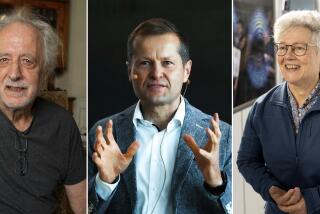The Physics of Money
The speed of light isn’t constant, Einstein’s theories of relativity are wrong and quarks don’t behave as physicists had predicted. In recent months, these three radical hypotheses have gained such currency in academia that even leading physicists have begun to wonder whether something’s the matter with our theories about matter.
In the first discovery, a paper published in last month’s edition of Physical Review shows that the speed of light, regarded as one of the few constants in nature, may have varied as recently as 2 billion years ago.
In the second discovery, satellite telescopes looking at images so distant that their light originated just 380,000 years after the Big Bang have detected particles of matter millions of light-years apart. Since nothing is known to travel faster than light, the particles throw into question Einstein’s theoretical speed limit.
In the third discovery, scientists, after slamming heavy hydrogen atoms into gold at New York’s Brookhaven National Laboratory, discovered that quarks, rather than behaving like separate billiard balls, instead clumped into pools of matter they analogized to pudding.
These discoveries have arguably roiled physicists more than anything since Galileo Galilei’s 1613 paper hypothesizing that the Earth revolved around the sun. For that, the Catholic Church placed him under house arrest. Physicists today face less dramatic struggles, mostly about money. Congress’ 1993 decision to scrap the Superconducting Supercollider, a planned 54-mile-long tunnel beneath the Texas prairie in which physicists could study the behavior of subatomic particles, is a case in point. Legislators canceled it when cost estimates for its completion reached $11 billion.
Without funding for what some see as costly toys, discoveries that open new vistas in scientific knowledge and indirectly lead to society-changing technical innovations become more difficult. U.S. dominance in physics research is clearly slipping, as measured by the number of patents awarded and papers published. Fewer American students are training to become scientists and engineers. Meanwhile, Japan, Taiwan and South Korea in the last decade have seen rapid growth in the number of doctoral degrees and patents awarded.
Sens. Joe Lieberman (D-Conn.) and Jeff Bingaman (D-N.M.) are pushing Congress to reverse the 20% decline over the last 15 years in the budget of the Energy Department’s Office of Science, the key U.S. agency funding basic physics research. Next year, they’d like a 10% increase.
No one in physics is sure whether the recently developed data demand a reformation -- a tweaking of existing theories to accommodate new findings -- or a revolution, a scrapping of basic assumptions about the material world. To find the answers will take more than physicists’ eagerness.






